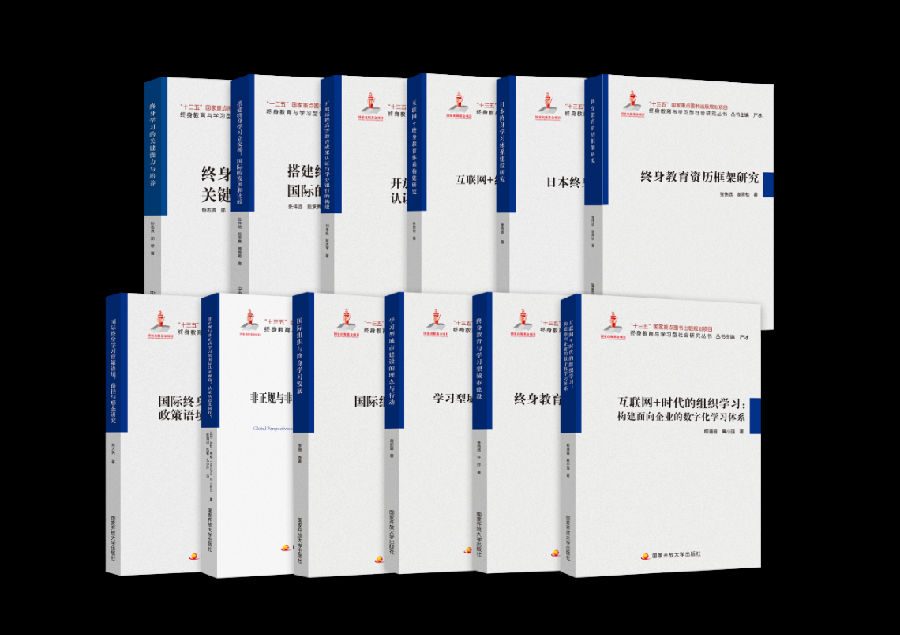 A series of key academic books launched by the Open University of China (OUC) Press in recent years, “Studies on Lifelong Education and Learning Society,” was published recently.
A series of key academic books launched by the Open University of China (OUC) Press in recent years, “Studies on Lifelong Education and Learning Society,” was published recently.
The publishing programme for the book series was included in the national key book publishing plan in the 12th Five Year Plan in 2014 and the 13th Five Year Plan in 2017, and was supported by the National Publication Foundation in 2020.
Lifelong education has become a common global cause. One of the strategic tasks of educational modernisation in China is to construct an education system serving lifelong learning for all people and build a learning society. The book series “Studies on Lifelong Education and Learning Society” is committed to studying the theoretical and practical issues related to the major strategy of education modernisation and state modernisation. Taking a global perspective, the book series demonstrates the basic characteristics of theoretical research and practical explorations in close combination with China's basic national conditions.

The books focus on analysing the difficulties faced in the construction of a learning society and lifelong learning system serving the whole people, and explore solutions to address such difficulties. The books active explore the reform of the supply model of lifelong education, an effective governance mechanism, and the efforts taken to identify the correlations and logical structure of different types of learning elements, with the aim of better meeting the diverse learning needs of citizens and truly integrating lifelong learning concepts of all kinds of education at all levels. The books also aim to alleviate the pressure of educational inequality caused by the imbalance of educational resources in China in order to achieve the goal of enhancing social soft power, the coordinated development of education at various stages, and the empowerment of individuals with the effective use of modern information and technology.
As of now, a total of 12 books in the series have been published, with Yan Bing, former vice president of the OUC and former editor-in-chief of the journal Distance Education in China, as chief editor. The authors of the books include not only experts and scholars with great influence in the field of international lifelong education, but also authors from other universities. However, the majority of the authors and translators come from the open university system in China. Eighteen experts and scholars in related fields were also invited to review the contents of the manuscripts. Thanks to the efforts and wisdom of the experts and scholars, the quality of the academic contents of the programme has been ensured.
The book series has the following outstanding features:
First, the books adopt Internet thinking and an empirical research method integrating quantitative and qualitative approaches to study the strategic issues faced in China's educational innovation practices in the context of globalisation, including the construction of an education qualification framework in China, the certification of learning achievements, the construction of a learning society and smart cities, the sustainable development of organisations, and the improvement of the lifelong learning abilities of individual citizens.
Second, they focus on key issues that need to be solved in the construction of a modern education system serving lifelong learning for all from the perspectives of the mutual recognition of learning achievements of all kinds of education at all levels and the in-depth integration of qualifications with industry employment standards. The books fully reflect the major achievements made in the exploration of a one-stop, intelligent, and personalised qualification framework and a mutual credit recognition system with the support of emerging technologies, such as cloud computing, big data, artificial intelligence, and blockchain. The aim is to realise the mutual recognition and exchange of qualifications and credits among alliance members. Studies are also made on education methods beyond enterprise training and the innovation of organisational learning and knowledge sharing, which provides a theoretical basis, system model, technologies, and reference examples for the construction of an effective digital lifelong learning system.
Third, attention is given to the all-round development of human beings. The series studies changes in individual learning models, career planning, and harmonious and stable development from the perspectives of the future forms of international lifelong learning and humanistic lifelong learning. The books advocate for the creation of an open and flexible learning environment and the optimisation of the allocation of learning resources, the provision of learning resources that meet the needs of personalised growth for multiple terminals, and the development of rich and colourful community learning activities in line with people’s interests and cognitive level. They also call for guiding people to actively participate in education, relieve psychological pressure, and use the knowledge and skills they have learned to solve various problems in their life, especially in work, through case studies, so as to promote the coordinated development of both themselves and society, and push forward the development of China's education towards a more equitable and quality oriented direction.
Fourth, from the perspective of global governance, the books study the context of lifelong learning policies, the paths for the implementation of said policies, as well as the policies that promoting lifelong learning through the construction of learning cities. They also investigate the effective mechanisms and policies of UNESCO, OECD, the World Bank, the EU, and other important international organisations have enacted to promote lifelong learning. The key elements of promoting the development of lifelong learning are analysed from social, economic, and personal perspectives, which is helpful for promoting a connection between China's lifelong education system and the world.
By Lai Jiwen,OUC